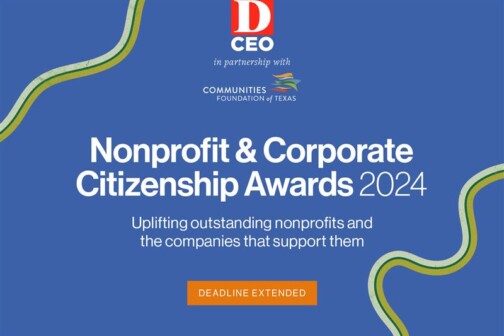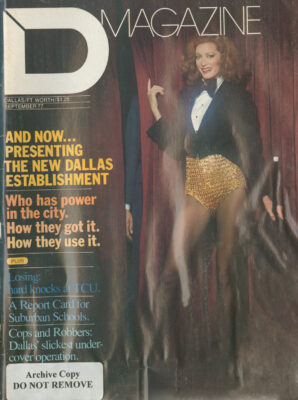New power in Dallas, unlike its predecessor, is not built upon a simple pyramid of the city’s major business institutions. Instead, it is formed around three overlapping, but distinct power spheres, or orbits. These power orbits often work together, but each has its individual interests, duties, and constituency.
Such a structure is reflective of the new political realities in the city: The three spheres, with their widely varying interests, can accommodate Dallas’ increasingly vocal special interests; and because the orbit structure naturally diffuses power, the new establishment will never be accused, like its predecessor, of running the city as if it owned it.
The three spheres have titular heads – Mayor Bob Folsom, Chamber of Commerce chairman Dave Fox and Citizens Council executive vice president Alex Bickley. But the word “titular” should be emphasized: Unlike the days of old, individual power is not only impossible, but undesirable to attain. The three power orbits of the new Dallas establishment are, in fact, run democratically by clusters of organizations and individuals. Consensus, even within a power sphere, is not assumed, but hammered out issue by issue. Coalitions are built when necessary. In short, the new Dallas establishment indicates that the Dallas business community, for the first time in many years, understands politics in the real world.
Mayor Bob Folsom’s power orbit is based on his current six-five majority on the city council and his well-oiled working relationship with City Manager George Schrader. The latter cannot be underestimated in terms of sheer power. In a council-manager form of government, power – the ability to get things done – is in large part defined by the city manager. According to one city council member, Folsom understands this so well that he largely ignores the council – except when he needs the requisite six votes – and concentrates his efforts on Schrader and the bureaucracy. With results: It is no coincidence that in the past year, half a billion dollars in private investment has been sunk into downtown development; that a new sports arena and arts complex are being discussed; that the city council is finally ready to do something about Central Expressway.
When Folsom needs those six votes, he can count on Republican City Councilman John Leedom. Leedom provides Folsom with a political alter ego: The mayor can afford to be above the fray because Leedom is so willing to jump in the middle of it. He’s Folsom’s most visible link to that all-important Republican North Dallas constituency.
The third component of Folsom’s sphere is the Central Business District Association and its co-chairmen, Jim Goodson, president of Southland Life Insurance, and Hunt Oil president Ray Hunt. Though the CBDA obviously operates autonomously from city hall, it falls into the city sphere because its vested interests are so tied into city hall and the Schrader-Folsom alliance.
Alex Bickley’s sphere may seem most familiar. Essentially, Bickley heads – in public, at least – the Old Guard of the business community. His power base is a revitalized Dallas Citizens Council, which has emerged as the public mouthpiece for business community issues.
Joining Bickley in his orbit are Citizens Council heavies Dewey Presley and Bill Seay. The two businessmen emerged in late 1975 as the key transitional figures between the Old Guard and the new: Not only did they lead the charge to make the Citizens Council “go public,” they were instrumental in leading Old Guard support of the new establishment’s work in the desegregation crisis.
Bickley’s power base is buttressed by the big banks and their monied Clearing House Association. Also, the banks’ participation in the Citizens Council’s financial liaison committee has provided Bickley some needed strokes with various elected bodies in the county. The committee already has had impact on the financial practices of the county hospital board and the commissioners court. Again, Bickley’s sphere does not necessarily work with Folsom’s or Fox’s on a day-to-day basis. But when necessary, coalitions are struck: The desegregation crisis is one example; the jail site battle is another.
Dave Fox heads a power sphere composed of paradoxical components. Ostensibly, it is based on the Dallas Chamber of Commerce, which Fox chairs. Joining the Chamber is the North Texas Commission and its chairman, Republic Bank’s president Charles Pistor. These two organizations carry on the basic function of promoting and selling the Dallas area: the Chamber attempting to recruit new conventions and businesses for Dallas, the NTC concentrating on hustling international air routes for the regional airport.
But Fox’s real power derives from the chamber’s adjunct community action group, the Dallas Alliance. The alliance, a tri-racial forum, provides the new establishment a link to the minority communities – something vitally needed in today’s power game. As chairman of the alliance, Hunt Investments president Walt Humann is influential with the minority communities, as is former Alliance chairman Jack Lowe, president of Texas Distributors. Sanger’s president Jack Miller, official liaison between the business community and the schools, is another vital link in the new establishment – minorities relationship. These ties have already produced the new establishment’s greatest achievement: successful implementation of a desegregation plan for the Dallas schools last year.
On a day-to-day basis, Folsom’s and Fox’s spheres have little to do with one another: One is concerned with bricks and mortar, the other with sensitive social issues. But at times, coalitions are useful – and effective. Consider how the barrage of criticism – first from Fox and the chamber, then from the CBDA and Folsom – recently forced the county commissioners to back off a downtown site for the new county jail.
Related Articles

D CEO Award Programs
Deadline Extended: D CEO’s Nonprofit and Corporate Citizenship Awards 2024
Categories include Outstanding Innovation, Social Enterprise, Volunteer of the Year, Nonprofit Team of the Year, Corporate Leadership Excellence, and more. Get your nominations in by April 19.
By D CEO Staff

Local News
Texas Lawmakers Look to Take Zoning Changes Out of Dallas’ Hands
Dallas is taking resident input on its ForwardDallas land use plan, and a vocal group is leading the opposition. But new talk among conservative Texas policy makers indicates the decision might not be in the city's hands for long.

Healthcare
Convicted Dallas Anesthesiologist Could Face 190 Years for “Toxic Cocktails” in IV Bags
Dr. Raynaldo Ortiz worked at the Baylor Scott & White Health facility after spending time in jail for shooting a dog and while having a suspended medical license.
By Will Maddox


